高三:情态动词 复习课件
图片预览
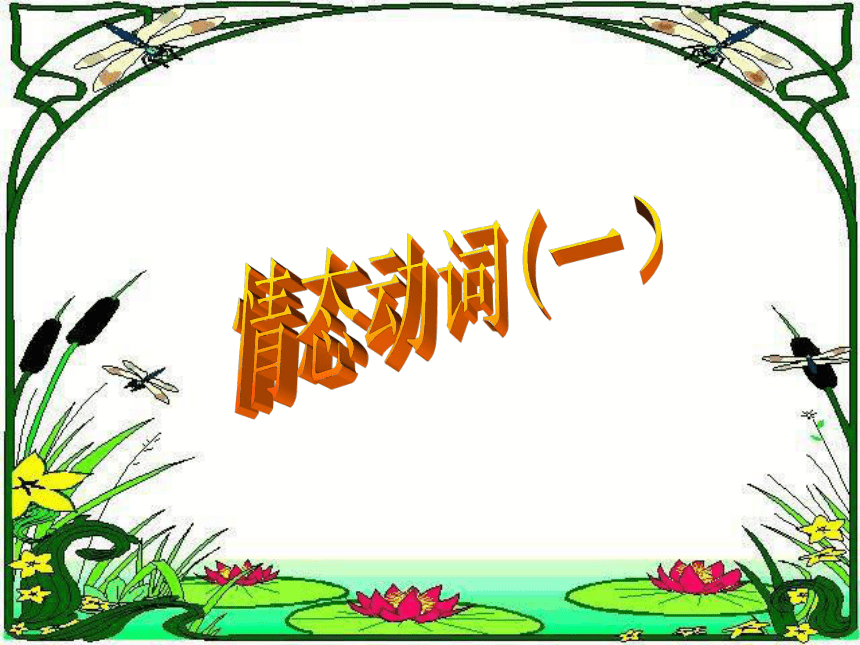
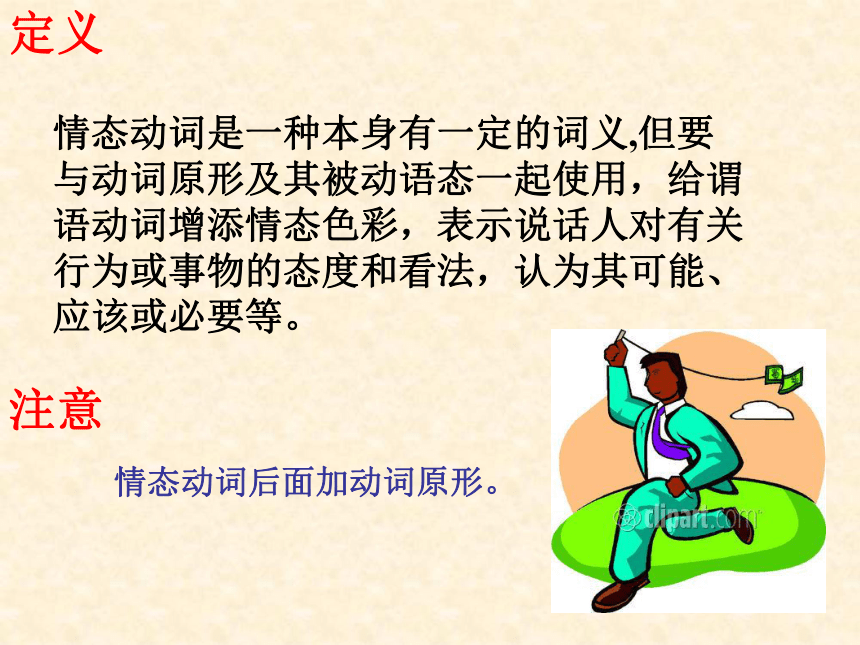
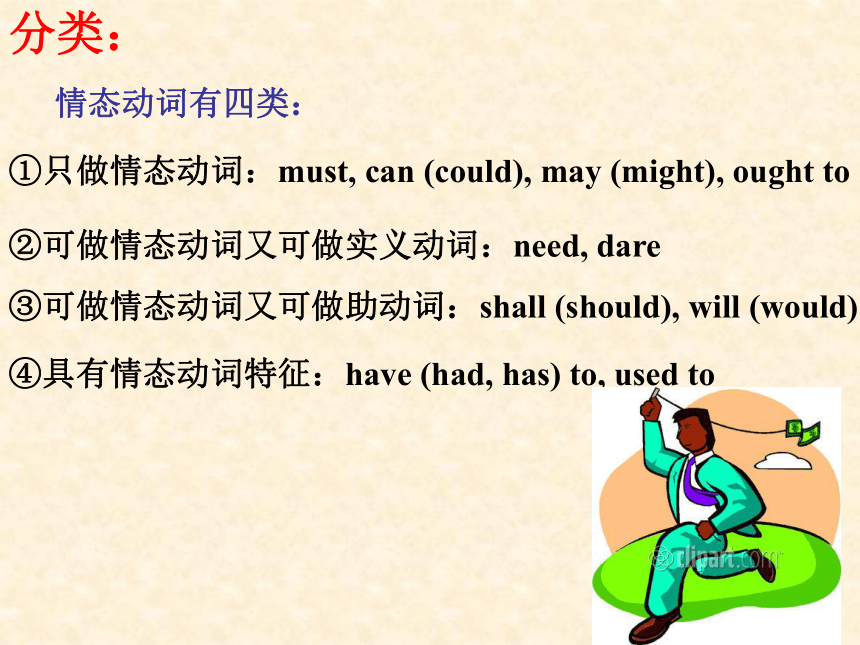
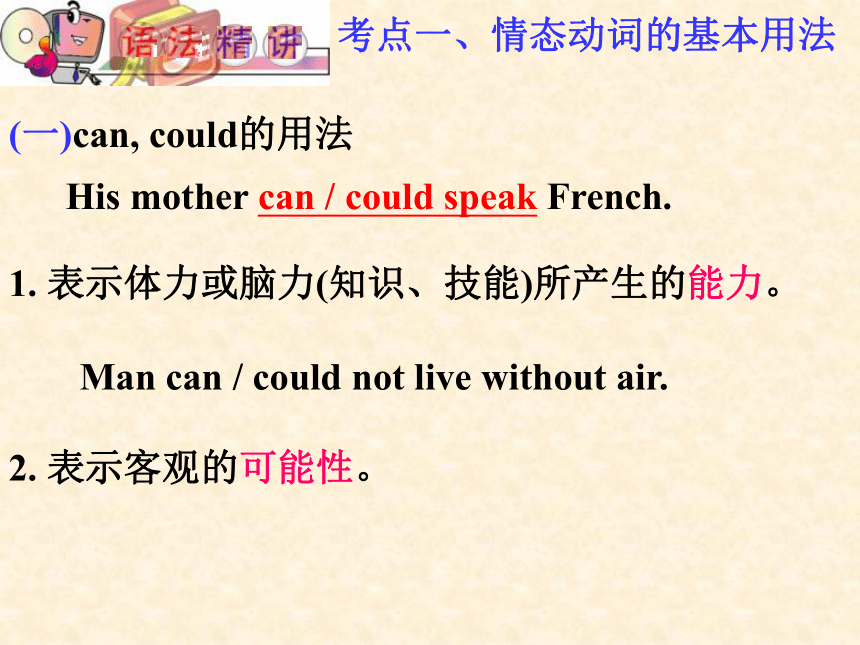
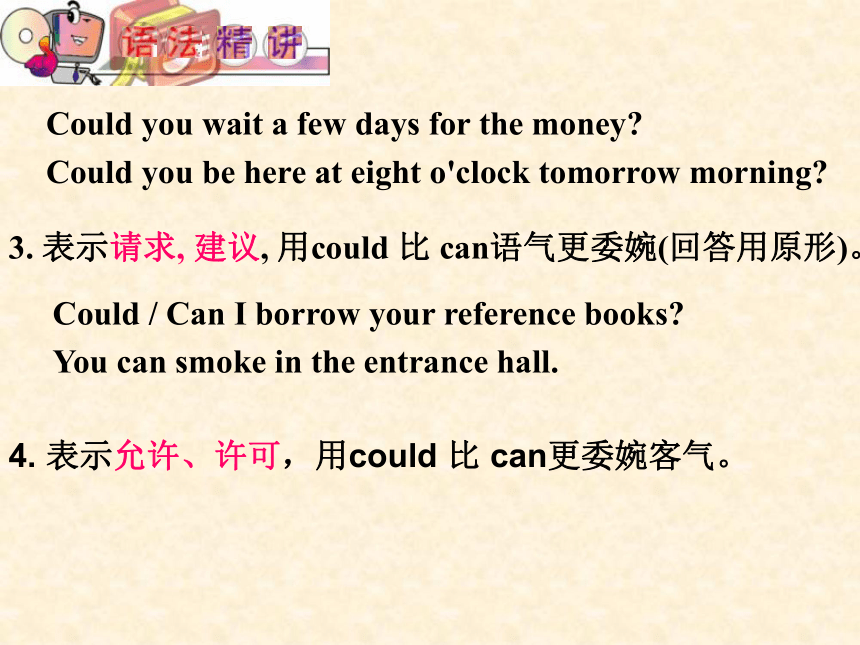
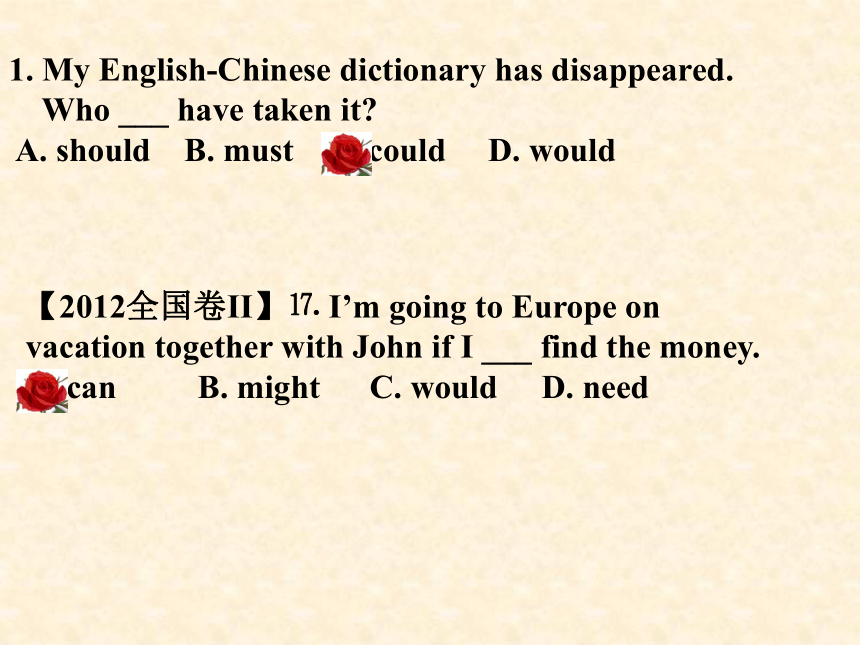
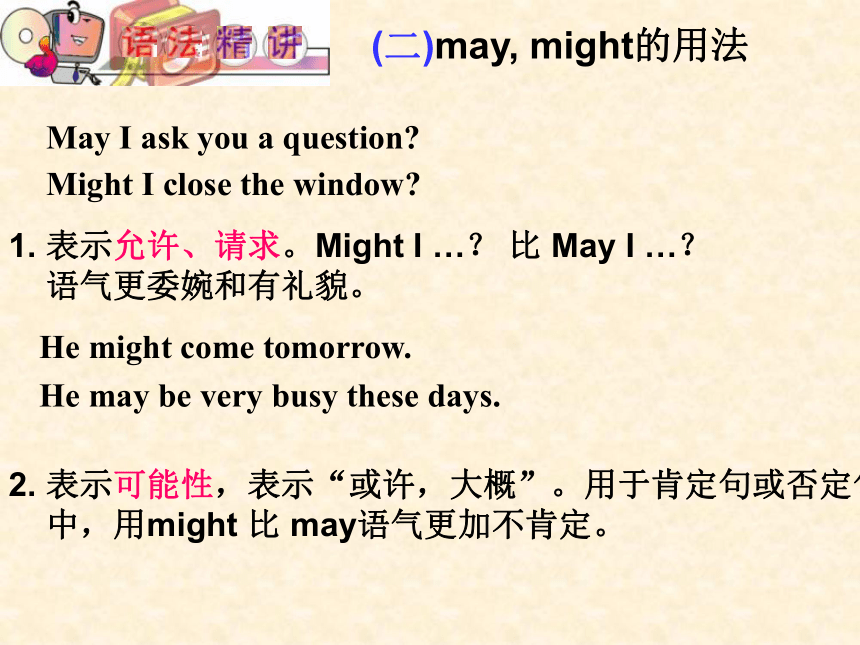

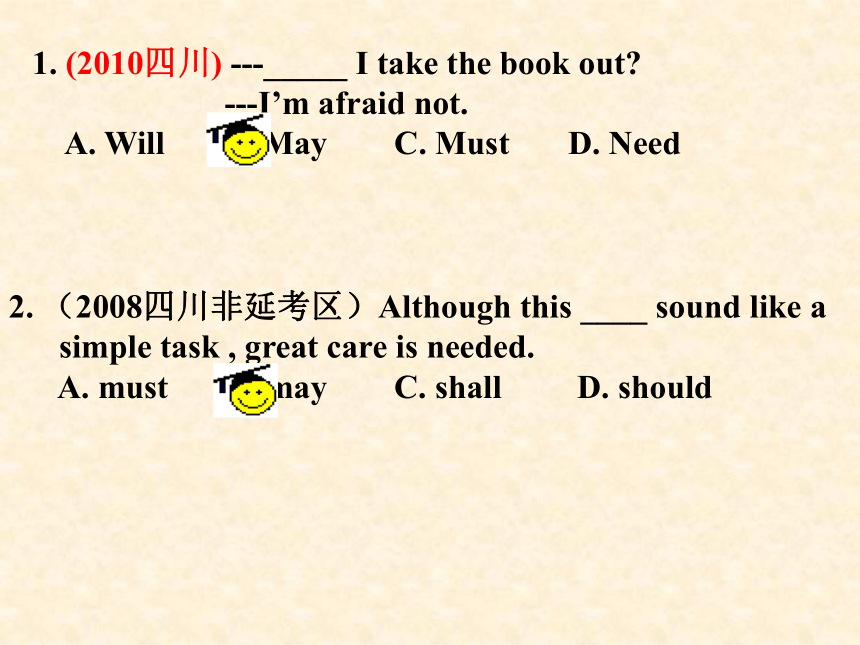
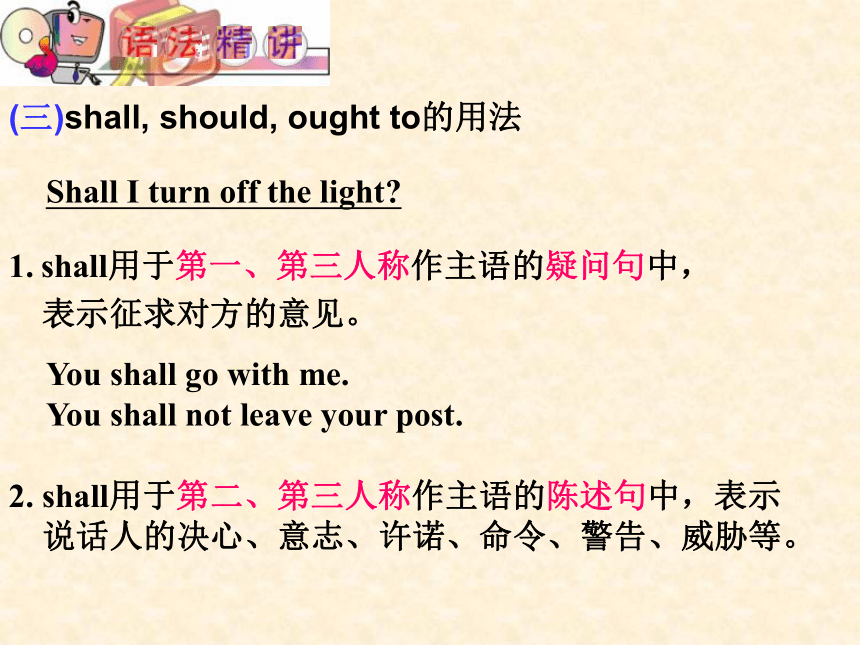
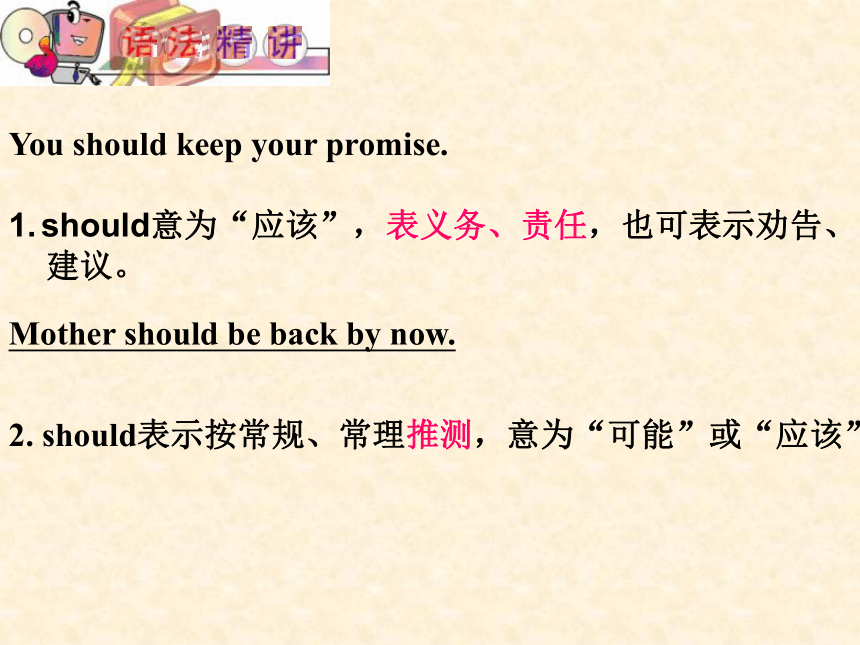
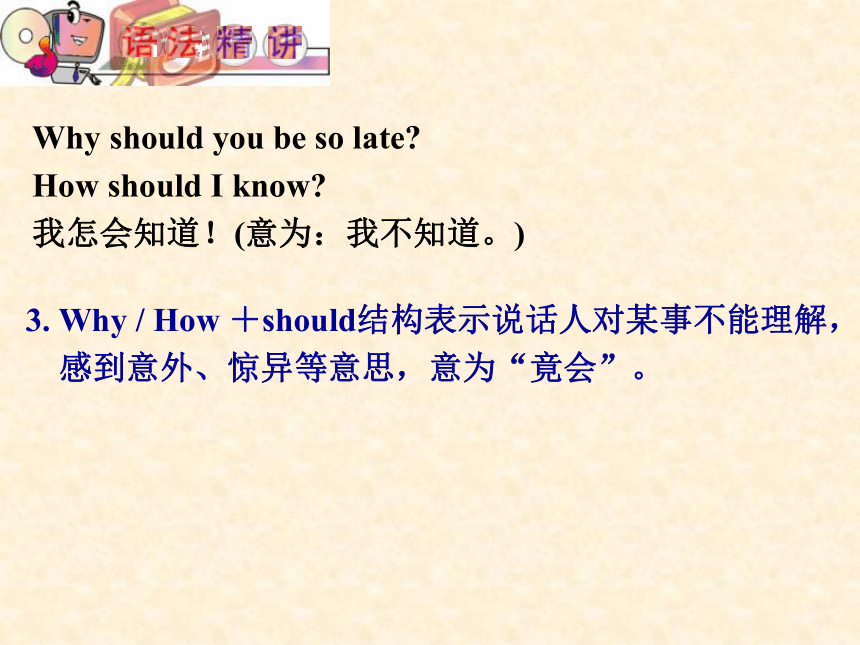
文档简介
课件48张PPT。情态动词(一)定义情态动词是一种本身有一定的词义,但要与动词原形及其被动语态一起使用,给谓语动词增添情态色彩,表示说话人对有关行为或事物的态度和看法,认为其可能、应该或必要等。 情态动词后面加动词原形。 注意分类: 情态动词有四类: ①只做情态动词:must, can (could), may (might), ought to②可做情态动词又可做实义动词:need, dare③可做情态动词又可做助动词:shall (should), will (would)④具有情态动词特征:have (had, has) to, used to(一)can, could的用法考点一、情态动词的基本用法1. 表示体力或脑力(知识、技能)所产生的能力。 His mother can / could speak French. Man can / could not live without air.2. 表示客观的可能性。Could you wait a few days for the money?
Could you be here at eight o'clock tomorrow morning?3. 表示请求, 建议, 用could 比 can语气更委婉(回答用原形)。4. 表示允许、许可,用could 比 can更委婉客气。Could / Can I borrow your reference books?
You can smoke in the entrance hall. 1. My English-Chinese dictionary has disappeared.
Who ___ have taken it?
A. should B. must C. could D. would【2012全国卷II】⒘ I’m going to Europe on vacation together with John if I ___ find the money.
A. can B. might C. would D. needMay I ask you a question?
Might I close the window?1. 表示允许、请求。Might I …? 比 May I …?
语气更委婉和有礼貌。(二)may, might的用法2. 表示可能性,表示“或许,大概”。用于肯定句或否定句
中,用might 比 may语气更加不肯定。He might come tomorrow.
He may be very busy these days. May you succeed!
May the friendship between us last forever!3. 表示祝愿。(不用might)采用部分倒装语序:may+主语+动词原形+……1. (2010四川) ---_____ I take the book out?
---I’m afraid not.
A. Will B. May C. Must D. Need2. (2008四川非延考区)Although this ____ sound like a
simple task , great care is needed.
A. must B. may C. shall D. shouldShall I turn off the light?(三)shall, should, ought to的用法shall用于第一、第三人称作主语的疑问句中,
表示征求对方的意见。You shall go with me.
You shall not leave your post.2. shall用于第二、第三人称作主语的陈述句中,表示
说话人的决心、意志、许诺、命令、警告、威胁等。You should keep your promise. should意为“应该”,表义务、责任,也可表示劝告、
建议。Mother should be back by now.2. should表示按常规、常理推测,意为“可能”或“应该”。Why should you be so late?
How should I know?
我怎会知道!(意为:我不知道。)3. Why / How +should结构表示说话人对某事不能理解,
感到意外、惊异等意思,意为“竟会”。You ought to finish your work before you go home.ought to表示责任和义务“应该”,语气比 should
强;还可表推测。例如:You have practiced for a long time. There ought to be no
difficulty for you. 1. — The room is so dirty. ______ we clean it?
— Of course. (2003北京春)
A. Will B. Shall C. Would D. Do【2012辽宁】2. One of our rules is that every student ____ wear school uniform while at school.
A. might B. could C. shall D. will3. If you listen to me, you _____ have some candies , dear.
A. shall B. might C. will D. would--- Shall I go and buy more fruits for the party?
--- No, I have already bought 3 baskets. That
____ be enough.
A. can B. should C. may D. might(2009天津)this printer is of good quality. If it ____ break down within the first year, we would repair it at our expense.
A. would B. should C. could D. might---Look ,there is a lot of smoke coming from the house .
---It _____be a fire ,most probably.
A. must B. ought to C. can D. mayI will do my best to help you.
He said that they would help us. (四)will, would,used to的用法用于各种人称,表示意志或决心。will指现在,
would则指过去。2. 用于第二人称的疑问句中表示有礼貌的询问和请求,
would 比 will更委婉。Would you teach me how to drive a car?
Will you please give him a message when you see himFish will die without water.
He would come to see me on Sunday when he was in Beijing. 3. 表示习惯性、经常性、倾向性,意为“总是”,“惯于”。
will指现在,would是指过去。That will be the man you want to see.
Perhaps she would be willing to meet us. 4. 表示说话人的推测,意为“大概,也许”。would 的
肯定性不如will强,语气比较弱。would 与used to 的区别:
We would sit in the yard every evening and listen to his story.
We used to sit in the yard every evening and listen to his story.
There used to be a park here. used to表示过去的某种习惯,现在已经没那样的习惯了;
would 表示过去有某种习惯,现在可能还有。
表示过去的状态,只能用used to,不能用would。【2012福建】31. We lost our way in that small village, otherwise we _____ more places of interest yesterday.
A. visited B. had visited
C. would visit D. would have visited7. Mike promised his doctor he _____ not drink, and he
has never drunk ever since.
A. might B. should
C. could D. wouldI _________get up late, but now I have got used to getting
up very early.used toEverybody must obey the rules.
You mustn't speak like that to your mother.(五)must,have to的用法must 表示“必须”。强调主观看法,只有现在时形式,否定式是must not (mustn‘t),表示“禁止”,“不准”。— How old are you, madam?
— If you must know, I'm twice my son's age.2. must有“偏要、硬要”之意。As he had broken his leg, he had to lie in bed. have to表示“必须,不得不”,着重强调客观需要,
能用于更多时态(过去式和将来式)。(六) need的用法You needn't water the tomato plants now.
— Need he come now?
— Yes, he must. / No, he needn‘t. / he doesn’t have to.need作情态动词表示“需要”,“必要”。通常用于
否定句、疑问句、条件句中,且只有现在时,其他时态
用“have to”的相应形式代替。The house needs repairing.
=The house needs to be repaired.
房子需要修理。2. need还可以用作行为动词,其变化和一般的动词相同。
若主语为动作承受者时用动词主动形式表示被动意义或
用不定式的被动形式。--- _____ you interrupt now? Can’t you see I’m on
the phone? (2012重庆)
--- Sorry Sir, but it’s urgent.
A. Can B. Should C. Must D. Would2. The new law states that people _____ drive after drinking alcohol. (2012上海)
A. wouldn’t B. needn’t C. wont’ D. mustn’t3. ---Shall I inform him of the change of the schedule right now? (2011福建)
--- I am afraid you ______, in case he comes late for the meeting.
A. will B. must C. may D. can.---Lucy doesn’t mind lending you her dictionary.
---She ___. I’ve already borrowed one.
A. can’t B. mustn’t
C. needn’t D. shouldn’t【2012全国】30. I _use a clock to wake me up because at six o'clock each morning the train comes by my house.
A. couldn't B. mustn't
C. shouldn't D. needn'tShe dare not go there.
How dare she do such a thing?(七)dare的用法1. dare作情态动词表示“敢于”用于否定句、疑问句和
条件句中。2. 惯用短语“I dare say”意为“我想,大概”。I dare say he is right.Do you dare to jump into the ocean?
I don't dare (to) ask her.3. dare还可以用作行为动词,其变化与一般动词相同。
(在否定句中时,dare后的“to+动词原形”可以省略to)。考点二:can/may/must/need 问句的回答方式疑问句式肯定句式否定答式you may.mustn’t/may not.you mustneedn’t/don’t have to.you must.needn’t/don’t have to.1. --Will you stay for lunch?
--Sorry, _____. My brother is coming to see me.
A. I mustn’t B. I can’t
C. I needn’t D. I won’t
2. --May I pick a flower in the garden?
-- ________.
A. No, you needn’t B. Not, please.
C. No, you mustn’t D. No, you won’tB C 考点三:固定搭配中的情态动词:cannot/couldn’t but do sth. 不得不;只好“cannot/(can‘t)…too/over/enough”。表示
“无论怎么……也不(过分)”,用来加强语气I couldn't but choose to wait.May/(might) as well+动词原形:不妨做……,最好Now that they were all here, she might as well speak
her mindYou cannot be too careful.May/might well 很可能----His appearance has changed so much that you
may well not recognize him.1. I _____ thank you too much for all you help to
my son while we were away from home.
A. won’t B. can’t C. can D. will2. Liza ____ well not want to go on the trip ---
she hates traveling.
A. will B. can C. must D. may考点四:情态动词表推测情态动词 can, could, may, might,must表推测的用法: 情态动词中的can, could, may, might, must都表推测。
其中must的可能性最大,can / could次之,
may / might最小。(可能是Kate。)(不可能是Marry。)Someone is knocking
at the door.
Who is it?
(一定是Tom。)It must be Tom.It /may /might be Kate.It can’t be Marry 表猜测,用于肯定句中,“一定”
____ 表猜测,常用于否定、疑问句中
____ 表猜测,常用于肯定、否定句中
must____→can’t_____
couldn’t_______
May________ → might not________
表猜测的情态动词 must can/could may/ might一定不可能可能不不可能可能他肯定知道我的地址。
他肯定不知道我的地址。
他知道我的地址吗?
1. must表推测只能用于肯定句。
如表示“一定不、肯定不”的意思时,应用can`t, 如询问某种可能时,应用can。He must know my address.He can`t know my address.Can he know my address?(一定)(一定不)(询问可能性)2. must表示推测时,可以推测现在/正在发生的动作/
过去发生的动作。他一定有辆小汽车。
He must have a car now.
他一定正在教室里做练习。
He must be doing his exercises in the classroom.
他一定已完成了工作。
He must have finished the work.注:must表示推测时很少用于将来的情况。
一般不用He must come tomorrow.可用It's certain /
I'm sure that he will come tomorrow.He must be a worker, _________? (现在)
You must have learned English for many years,____________? (完成时)
比较:
It must have rained last night, ________? (过去)
He must have arrived by yesterday morning, _________?在反意疑问句中,当附属部分含有表示推测意义的
must时,疑问部分的助动词应与must后面的动词
在非推测情况下的用法保持一致。isn't hehaven't youdidn't ithadn’t he2. can / could的用法 (1)can表示推测“可能性”时,往往用于否定句或疑问句。can`t “一定不”,can在疑问句中意思是“会、可能”。 = It is impossible that he is at home. 他一定不在家。 (2)can /can`t+ have done,表示对过去发生的动作进行推测。
他不可能去了上海,我刚才还看见他。
天晚了,她可能去哪儿了呢?He can't be at home.He can't have gone to Shanghai for I saw him
a minute ago.It`s so late. Where can she have gone?3. may和might的用法 (1) may, might表示推测“可能性”时,意思是“可能”、“也许”
他可能是个美国人。
注:might不表示过去时态,只是语气上比may更委婉,表示的可能性更小。 (2)may, might表推测时,可以用于否定句,意思是“可能不、也许不”,但不用于疑问句。
他也许不在家。 He may / might be American. = It is possible that he
is American.He may / might not be at home. (3)may, might可以推测现在正在发生的动作或过去发生的动作。
这个男孩可能没在家看电视
这些学生以前可能看过这部电影。 The boy may / might not be watching TV at home.These students may / might have seen the film
before.(过去) 4. –What____ it be? --It______ be a mail box, for it is moving.
It______ be a car. A. can; can’t; must B. can; can; must C. can; mustn’t; must D. must; mustn’t; can
5. –Look, someone is coming. Guess__________ . --Jack. He’s always on time. A. who can it be B. who he may C. who he can be D. who it can be情态动词+have+done”
表“本来应该…” 使用情况分析一、should have done过去本来应该(而实际上并没有…)
should not have done 本不应该 …而实际上却已经…”
我们昨晚本应学习的,但我们却去看音乐会了。(实际上没有学习)We should have studied last night, but we went to
the concert instead .二、could have done
它表示“过去本来能够…” 实际上没能做…。我本来能用12秒钟完100米的.如果你当时能如期完成那任务的话,你可能已提升了I could have run 100 meters in 12 seconds.If you could have finished the task in time,you
could have been promoted.三、need not have done
它表示过去已做的事,事实上没有必要。我本来不必要那么早起床的我本来不必要等一个小时的火车。I need not have got up so early .I need not have waited for the train for an hour.四、would have done 用在虚拟语气中
表示与过去事实相反之假设的结果,常与if 的条件句连用。
1、 I would have helped you if I had known of your difficulties . 要是我当时知道你们的窘境,我就会帮助你了(而实际上没有帮助你)
2、If it hadn‘t rained yesterday, we would have gone out for a walk .假如昨天没下雨,我们就去散步了。
(实际上没有去)。Practice1.Mr White ____ at 8:30 for the meeting, but he didn’t turn up.
A. should have arrived
B. should arrive
C. should have had arrived
D. should be arriving2. If he had been here yesterday, he ______ this pop star.
A. would meet
B. would have met
C. met
D. must have met3.It is hard for me to imagine what I would be doing today if I____ in love at the age of seven with the Melinda Cox Library in my hometown.
A. wouldn’t have fallen
B. had not fallen
C. should fall
D. were to fall
Could you be here at eight o'clock tomorrow morning?3. 表示请求, 建议, 用could 比 can语气更委婉(回答用原形)。4. 表示允许、许可,用could 比 can更委婉客气。Could / Can I borrow your reference books?
You can smoke in the entrance hall. 1. My English-Chinese dictionary has disappeared.
Who ___ have taken it?
A. should B. must C. could D. would【2012全国卷II】⒘ I’m going to Europe on vacation together with John if I ___ find the money.
A. can B. might C. would D. needMay I ask you a question?
Might I close the window?1. 表示允许、请求。Might I …? 比 May I …?
语气更委婉和有礼貌。(二)may, might的用法2. 表示可能性,表示“或许,大概”。用于肯定句或否定句
中,用might 比 may语气更加不肯定。He might come tomorrow.
He may be very busy these days. May you succeed!
May the friendship between us last forever!3. 表示祝愿。(不用might)采用部分倒装语序:may+主语+动词原形+……1. (2010四川) ---_____ I take the book out?
---I’m afraid not.
A. Will B. May C. Must D. Need2. (2008四川非延考区)Although this ____ sound like a
simple task , great care is needed.
A. must B. may C. shall D. shouldShall I turn off the light?(三)shall, should, ought to的用法shall用于第一、第三人称作主语的疑问句中,
表示征求对方的意见。You shall go with me.
You shall not leave your post.2. shall用于第二、第三人称作主语的陈述句中,表示
说话人的决心、意志、许诺、命令、警告、威胁等。You should keep your promise. should意为“应该”,表义务、责任,也可表示劝告、
建议。Mother should be back by now.2. should表示按常规、常理推测,意为“可能”或“应该”。Why should you be so late?
How should I know?
我怎会知道!(意为:我不知道。)3. Why / How +should结构表示说话人对某事不能理解,
感到意外、惊异等意思,意为“竟会”。You ought to finish your work before you go home.ought to表示责任和义务“应该”,语气比 should
强;还可表推测。例如:You have practiced for a long time. There ought to be no
difficulty for you. 1. — The room is so dirty. ______ we clean it?
— Of course. (2003北京春)
A. Will B. Shall C. Would D. Do【2012辽宁】2. One of our rules is that every student ____ wear school uniform while at school.
A. might B. could C. shall D. will3. If you listen to me, you _____ have some candies , dear.
A. shall B. might C. will D. would--- Shall I go and buy more fruits for the party?
--- No, I have already bought 3 baskets. That
____ be enough.
A. can B. should C. may D. might(2009天津)this printer is of good quality. If it ____ break down within the first year, we would repair it at our expense.
A. would B. should C. could D. might---Look ,there is a lot of smoke coming from the house .
---It _____be a fire ,most probably.
A. must B. ought to C. can D. mayI will do my best to help you.
He said that they would help us. (四)will, would,used to的用法用于各种人称,表示意志或决心。will指现在,
would则指过去。2. 用于第二人称的疑问句中表示有礼貌的询问和请求,
would 比 will更委婉。Would you teach me how to drive a car?
Will you please give him a message when you see himFish will die without water.
He would come to see me on Sunday when he was in Beijing. 3. 表示习惯性、经常性、倾向性,意为“总是”,“惯于”。
will指现在,would是指过去。That will be the man you want to see.
Perhaps she would be willing to meet us. 4. 表示说话人的推测,意为“大概,也许”。would 的
肯定性不如will强,语气比较弱。would 与used to 的区别:
We would sit in the yard every evening and listen to his story.
We used to sit in the yard every evening and listen to his story.
There used to be a park here. used to表示过去的某种习惯,现在已经没那样的习惯了;
would 表示过去有某种习惯,现在可能还有。
表示过去的状态,只能用used to,不能用would。【2012福建】31. We lost our way in that small village, otherwise we _____ more places of interest yesterday.
A. visited B. had visited
C. would visit D. would have visited7. Mike promised his doctor he _____ not drink, and he
has never drunk ever since.
A. might B. should
C. could D. wouldI _________get up late, but now I have got used to getting
up very early.used toEverybody must obey the rules.
You mustn't speak like that to your mother.(五)must,have to的用法must 表示“必须”。强调主观看法,只有现在时形式,否定式是must not (mustn‘t),表示“禁止”,“不准”。— How old are you, madam?
— If you must know, I'm twice my son's age.2. must有“偏要、硬要”之意。As he had broken his leg, he had to lie in bed. have to表示“必须,不得不”,着重强调客观需要,
能用于更多时态(过去式和将来式)。(六) need的用法You needn't water the tomato plants now.
— Need he come now?
— Yes, he must. / No, he needn‘t. / he doesn’t have to.need作情态动词表示“需要”,“必要”。通常用于
否定句、疑问句、条件句中,且只有现在时,其他时态
用“have to”的相应形式代替。The house needs repairing.
=The house needs to be repaired.
房子需要修理。2. need还可以用作行为动词,其变化和一般的动词相同。
若主语为动作承受者时用动词主动形式表示被动意义或
用不定式的被动形式。--- _____ you interrupt now? Can’t you see I’m on
the phone? (2012重庆)
--- Sorry Sir, but it’s urgent.
A. Can B. Should C. Must D. Would2. The new law states that people _____ drive after drinking alcohol. (2012上海)
A. wouldn’t B. needn’t C. wont’ D. mustn’t3. ---Shall I inform him of the change of the schedule right now? (2011福建)
--- I am afraid you ______, in case he comes late for the meeting.
A. will B. must C. may D. can.---Lucy doesn’t mind lending you her dictionary.
---She ___. I’ve already borrowed one.
A. can’t B. mustn’t
C. needn’t D. shouldn’t【2012全国】30. I _use a clock to wake me up because at six o'clock each morning the train comes by my house.
A. couldn't B. mustn't
C. shouldn't D. needn'tShe dare not go there.
How dare she do such a thing?(七)dare的用法1. dare作情态动词表示“敢于”用于否定句、疑问句和
条件句中。2. 惯用短语“I dare say”意为“我想,大概”。I dare say he is right.Do you dare to jump into the ocean?
I don't dare (to) ask her.3. dare还可以用作行为动词,其变化与一般动词相同。
(在否定句中时,dare后的“to+动词原形”可以省略to)。考点二:can/may/must/need 问句的回答方式疑问句式肯定句式否定答式you may.mustn’t/may not.you mustneedn’t/don’t have to.you must.needn’t/don’t have to.1. --Will you stay for lunch?
--Sorry, _____. My brother is coming to see me.
A. I mustn’t B. I can’t
C. I needn’t D. I won’t
2. --May I pick a flower in the garden?
-- ________.
A. No, you needn’t B. Not, please.
C. No, you mustn’t D. No, you won’tB C 考点三:固定搭配中的情态动词:cannot/couldn’t but do sth. 不得不;只好“cannot/(can‘t)…too/over/enough”。表示
“无论怎么……也不(过分)”,用来加强语气I couldn't but choose to wait.May/(might) as well+动词原形:不妨做……,最好Now that they were all here, she might as well speak
her mindYou cannot be too careful.May/might well 很可能----His appearance has changed so much that you
may well not recognize him.1. I _____ thank you too much for all you help to
my son while we were away from home.
A. won’t B. can’t C. can D. will2. Liza ____ well not want to go on the trip ---
she hates traveling.
A. will B. can C. must D. may考点四:情态动词表推测情态动词 can, could, may, might,must表推测的用法: 情态动词中的can, could, may, might, must都表推测。
其中must的可能性最大,can / could次之,
may / might最小。(可能是Kate。)(不可能是Marry。)Someone is knocking
at the door.
Who is it?
(一定是Tom。)It must be Tom.It /may /might be Kate.It can’t be Marry 表猜测,用于肯定句中,“一定”
____ 表猜测,常用于否定、疑问句中
____ 表猜测,常用于肯定、否定句中
must____→can’t_____
couldn’t_______
May________ → might not________
表猜测的情态动词 must can/could may/ might一定不可能可能不不可能可能他肯定知道我的地址。
他肯定不知道我的地址。
他知道我的地址吗?
1. must表推测只能用于肯定句。
如表示“一定不、肯定不”的意思时,应用can`t, 如询问某种可能时,应用can。He must know my address.He can`t know my address.Can he know my address?(一定)(一定不)(询问可能性)2. must表示推测时,可以推测现在/正在发生的动作/
过去发生的动作。他一定有辆小汽车。
He must have a car now.
他一定正在教室里做练习。
He must be doing his exercises in the classroom.
他一定已完成了工作。
He must have finished the work.注:must表示推测时很少用于将来的情况。
一般不用He must come tomorrow.可用It's certain /
I'm sure that he will come tomorrow.He must be a worker, _________? (现在)
You must have learned English for many years,____________? (完成时)
比较:
It must have rained last night, ________? (过去)
He must have arrived by yesterday morning, _________?在反意疑问句中,当附属部分含有表示推测意义的
must时,疑问部分的助动词应与must后面的动词
在非推测情况下的用法保持一致。isn't hehaven't youdidn't ithadn’t he2. can / could的用法 (1)can表示推测“可能性”时,往往用于否定句或疑问句。can`t “一定不”,can在疑问句中意思是“会、可能”。 = It is impossible that he is at home. 他一定不在家。 (2)can /can`t+ have done,表示对过去发生的动作进行推测。
他不可能去了上海,我刚才还看见他。
天晚了,她可能去哪儿了呢?He can't be at home.He can't have gone to Shanghai for I saw him
a minute ago.It`s so late. Where can she have gone?3. may和might的用法 (1) may, might表示推测“可能性”时,意思是“可能”、“也许”
他可能是个美国人。
注:might不表示过去时态,只是语气上比may更委婉,表示的可能性更小。 (2)may, might表推测时,可以用于否定句,意思是“可能不、也许不”,但不用于疑问句。
他也许不在家。 He may / might be American. = It is possible that he
is American.He may / might not be at home. (3)may, might可以推测现在正在发生的动作或过去发生的动作。
这个男孩可能没在家看电视
这些学生以前可能看过这部电影。 The boy may / might not be watching TV at home.These students may / might have seen the film
before.(过去) 4. –What____ it be? --It______ be a mail box, for it is moving.
It______ be a car. A. can; can’t; must B. can; can; must C. can; mustn’t; must D. must; mustn’t; can
5. –Look, someone is coming. Guess__________ . --Jack. He’s always on time. A. who can it be B. who he may C. who he can be D. who it can be情态动词+have+done”
表“本来应该…” 使用情况分析一、should have done过去本来应该(而实际上并没有…)
should not have done 本不应该 …而实际上却已经…”
我们昨晚本应学习的,但我们却去看音乐会了。(实际上没有学习)We should have studied last night, but we went to
the concert instead .二、could have done
它表示“过去本来能够…” 实际上没能做…。我本来能用12秒钟完100米的.如果你当时能如期完成那任务的话,你可能已提升了I could have run 100 meters in 12 seconds.If you could have finished the task in time,you
could have been promoted.三、need not have done
它表示过去已做的事,事实上没有必要。我本来不必要那么早起床的我本来不必要等一个小时的火车。I need not have got up so early .I need not have waited for the train for an hour.四、would have done 用在虚拟语气中
表示与过去事实相反之假设的结果,常与if 的条件句连用。
1、 I would have helped you if I had known of your difficulties . 要是我当时知道你们的窘境,我就会帮助你了(而实际上没有帮助你)
2、If it hadn‘t rained yesterday, we would have gone out for a walk .假如昨天没下雨,我们就去散步了。
(实际上没有去)。Practice1.Mr White ____ at 8:30 for the meeting, but he didn’t turn up.
A. should have arrived
B. should arrive
C. should have had arrived
D. should be arriving2. If he had been here yesterday, he ______ this pop star.
A. would meet
B. would have met
C. met
D. must have met3.It is hard for me to imagine what I would be doing today if I____ in love at the age of seven with the Melinda Cox Library in my hometown.
A. wouldn’t have fallen
B. had not fallen
C. should fall
D. were to fall
